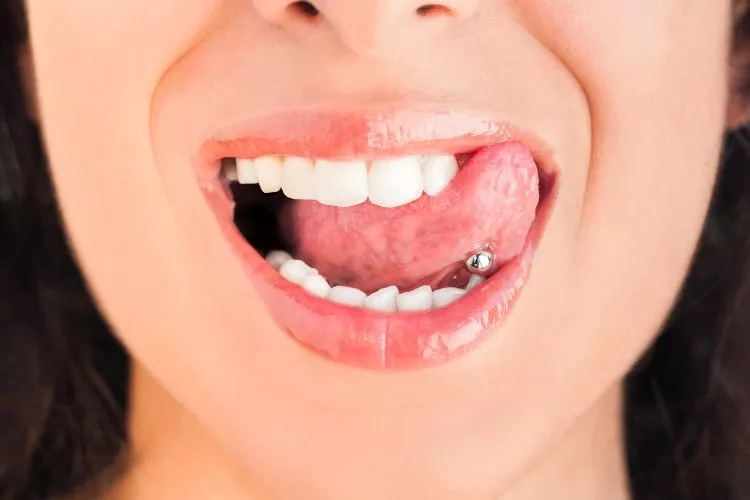In body art and modifications, tongue piercings have carved out a niche. They are popular among girls and have proven to be more than a fleeting trend.
Despite its popularity, however, the piercing of this distinctive body part may prompt the question: why do girls get tongue piercings?
This article aims to unravel the motivations for girls to get their tongues pierced.
Regardless of the common misconceptions about safety, hygiene and acceptance, girls continue to add this unique accessory to their persona.
Myriad reasons drive people towards such body modification, each as individual as the piercing itself.

While some pursue the rebellious allure related to body art, others see it as a form of personal expression or a fashionable choice.
Why do girls get tongue piercings?
Girls get tongue piercings for several reasons for example to celebrate individuality, as a fashion statement or as a symbol of rebellion.
- Expression of Individuality: Like tattoos and other body modifications, tongue piercings assert individuality and personal style.
- Fashion Statement: Tongue piercings can be seen as trendy, offering a unique way to accessorize and stand out.
- Symbol of Rebellion: Some girls see tongue piercings as a symbol of rebellious nature, challenging societal norms and expectations.
- Enhanced Sensation: Some believe tongue piercings can enhance sensory experiences, specifically taste or kissing.
- Personal Achievement: Getting and healing a tongue piercing can be seen as a rite of passage or personal challenge.
It’s important to remember that the motivation behind getting a tongue piercing is highly personal and varies from individual to individual.
As with any body modification, consider the potential risks and benefits before proceeding.
What does a tongue piercing symbolize?
Tongue piercings can symbolize various things based on cultural, personal, or societal contexts. They often represent a deviation from traditional practices, signifying rebellion or independence.
Many individuals view them as a mark of their individuality, asserting their unique personality and style.
Others interpret tongue piercings as a rite of passage marking a transition or achievement in their life. In some cultures, tongue piercings can have spiritual or ritualistic meanings.
It’s essential to remember that the symbolism of a tongue piercing can vary immensely from person to person, each interpretation as distinct as the individuals themselves.
Do tongue piercings make oral better?
While this is subjective and depends on personal experience, some claim that tongue piercings can enhance oral experiences.
They believe that the added metal can provide new sensations for the person with the piercing and their partner.

However, others may find this uncomfortable or even painful. It should also be noted that improper care can lead to infection or injury, which could negatively impact oral experiences.
What do dentists say about tongue piercings?
Most dental professionals express concerns about tongue piercings due to potential oral health complications.
Risks include chipped or cracked teeth, usually from biting on the piercing, and damage to the gums. Tongue piercings also increase the chance of infections, especially since the oral cavity is home to many bacteria.
Further complications could be swelling (which, in extreme cases, could cause difficulty breathing), nerve damage, or speech or normal oral function issues.
Dentists usually advise understanding the risks thoroughly and maintaining excellent oral hygiene if you decide to get a tongue piercing.
What are the benefits of a tongue piercing?
Tongue piercings hold various alluring benefits, but they can significantly differ for each person depending on the purpose behind the piercing.
- Individual Expression: For many people, a tongue piercing serves as a way to showcase personal style or create a unique persona.
- Symbolism and Significance: For some, it’s a tangible symbol of their courage, personal milestones or rebellious nature.
- Fashion Accessory: Tongue piercings are trendy and can be customized with different types of jewelry, making it a way to add a distinctive feature to one’s look.
- Enhanced Sensory Experience: Some people notice an enhanced sensory experience, like heightened taste or a different feel when kissing.
- Sense of Community: For some, it may be a way to align with a community with an avid interest in body modifications.
Despite these appealing benefits, it’s essential to weigh them against the potential risks and make an informed decision.
What are the disadvantages of tongue piercing?
While tongue piercing can offer some appealing benefits, they come with potential downsides as well, including the risk of:
- Physical Complications: Swelling, bleeding, nerve damage, or infection are potential risks immediately following the piercing.
- Dental Issues: Long-term tongue piercings can lead to chipped or cracked teeth, gum injury, and even swallowing or choking on jewelry pieces.
- Difficulty in Oral Function: There could be initial struggles with speaking, eating, or drinking post-piercing.
- Allergic Reaction: Some people might be allergic to the metal used in the piercing.
- Job Considerations: Some jobs or professions might not permit visible body modifications, making a tongue piercing potentially problematic.
It’s crucial to consider these potential disadvantages and consult with a professional to minimize risks if you decide to go forward with a tongue piercing.
Conclusion :
Throughout exploring why girls get tongue piercings, we’ve uncovered the underlying motivations, potential benefits, and potential disadvantages of this unique body modification.
From personal expression and fashion statements to rebellious symbols and sensory enhancements, the reasons behind getting a tongue piercing are as diverse as those who choose them.
In a rapidly evolving world that continues to embrace individuality and unique forms of self-expression, tongue piercings stand as a testament to breaking free from societal norms.
As we’ve seen, the pros and cons of getting a tongue piercing must be carefully weighed to make an informed decision.
Ultimately, it’s crucial to consider one’s lifestyle, personal goals, and potential risks associated with tongue piercings before taking the plunge.
Whether a reflection of personal taste, a rite of passage, or a bold accessory, tongue piercings remain fascinating and enigmatic.
As we expand our understanding of the meaning and motivations behind such body art, we must respect individual choices and foster open dialogue on topics like this one, embracing the diverse nature of the human experience.
